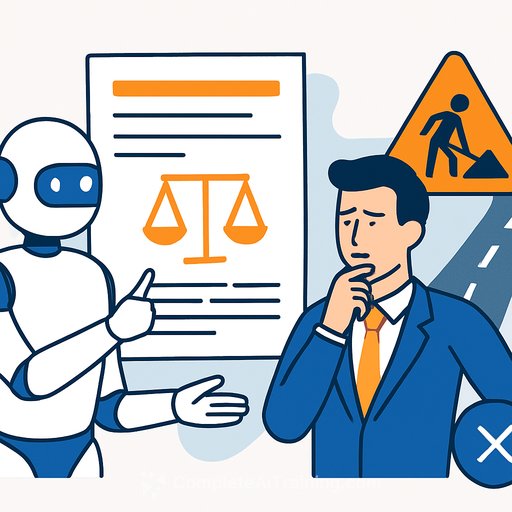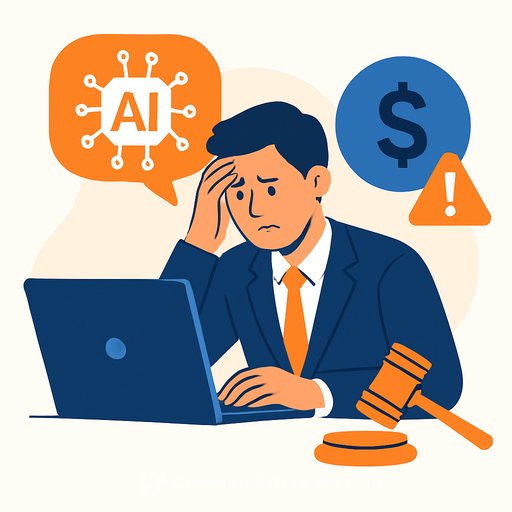Polish road tender: AI-generated bid with fake case citations leads to exclusion
A Polish construction firm, Exdrog, has been excluded from a provincial road maintenance tender after submitting a bid that relied on AI-generated explanations containing references to non-existent legal and tax rulings.
The bid, valued at 15.5 million zloty (€3.66 million), was initially the lowest. Rival bidders challenged it, arguing that Exdrog's justification for its abnormally low price cited fabricated authorities. The National Appeal Chamber (KIO) agreed and ordered the contracting authority to re-evaluate offers without Exdrog's submission.
What KIO said
According to KIO's spokesperson, the contractor used AI to produce an extensive, 280-page explanation that included false information. The chamber found the firm failed to verify AI outputs, which misled the authority. KIO characterized the issue as an oversight rather than intentional misrepresentation, but still grounds for exclusion.
Exdrog's CEO disputed any explicit mention of AI in the ruling and said the rejection stemmed from an abnormally low price finding. The firm indicated it may appeal once full written reasoning is received.
Why this matters for legal teams
- Abnormally low price procedures now come with a new risk: AI "hallucinations" in supporting documentation.
- Misleading a contracting authority-intentional or not-can trigger exclusion under public procurement rules and force re-tendering steps.
- Expect growing scrutiny of AI-assisted submissions and the provenance of cited sources, especially in complex price justifications and technical narratives.
Immediate implications for procurement counsel
- Verification duty: Any AI-assisted content must be fact-checked. Treat every citation as if it were expert testimony-verify existence, applicability, and jurisdiction.
- Source control: Require human review logs, reference lists with accessible links or official identifiers, and confirmation that case law and rulings actually exist.
- AI governance in bids: Introduce internal protocols on permissible AI use, including prompt logs, output review, and sign-off by responsible attorneys or engineers.
- Disclosure strategy: Consider proactive statements on the extent of AI assistance and the verification steps taken. Silence invites assumptions.
Guidance for contracting authorities and their advisors
- Request verifiable citations: Demand official references (case numbers, dates, issuing bodies) for jurisprudence and tax rulings cited in price explanations.
- Use targeted clarifications: In ALP procedures, ask bidders to authenticate specific authorities and provide copies or official links.
- Red flags: Overlong explanations with generic legal phrasing, inconsistent citation formats, or authorities that cannot be located in official databases.
- Document the review: Keep a clear audit trail showing checks performed and reasons for accepting or rejecting explanations.
Policy and compliance signals
The case will fuel discussion on how AI should be regulated in public procurement. Industry voices noted that AI can inflate costs if its outputs require deep verification-often as time-consuming as drafting from scratch. For now, the practical standard is simple: AI is allowed, but unverifiable claims are not.
Practical checklist to de-risk AI-assisted bids
- Run citations through official databases; attach copies or archival links.
- Include a human reviewer's attestation that all authorities were verified.
- Ban AI from fabricating sources; use retrieval-augmented workflows tied to curated legal databases.
- Track prompts and versions; preserve a record for potential appeals.
- Align internal policy with broader AI governance guidance and update training accordingly.
Context
- Polish firms have among the EU's lowest reported AI adoption rates, according to Eurostat, but public bodies are already confronting AI-related risks in tenders. See Eurostat's overview: AI use by enterprises.
- EU AI policy continues to mature. For a high-level view of the EU's approach, see the European Commission's policy page: European approach to AI.
For teams building AI literacy
If your legal or procurement team needs structured upskilling on prompt discipline, verification, and workflow design, explore role-focused options here: AI courses by job.
Bottom line
AI won't excuse unsupported claims in public tenders. If a tool helps draft your case, your people still own the facts. Verify every citation, document your checks, and assume your submission will be challenged.
Your membership also unlocks:






